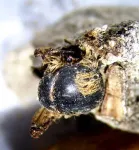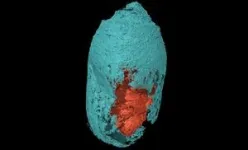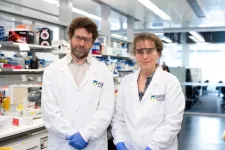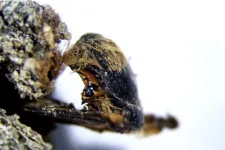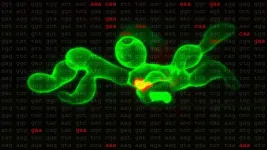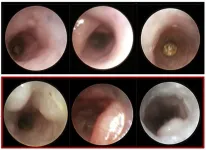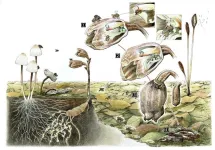Getting protein factories to run – How deubiquitinating enzymes moonlight as Fubi proteases
Max Planck researchers identify mechanisms of key players in the maturation process of ribosomes with chemical biology tool kit
2023-08-24
(Press-News.org)
Fubi is produced by cells as a fusion protein with the ribosomal protein S30, and must be separated from S30 by proteases for functioning ribosomes. In immune cells, this by-product of ribosome production is utilized as a secreted signalling molecule, for example to locally reduce the activity of the maternal immune system in the uterus and to thus enable embryos to implant. How Fubi is specifically recognized by proteases and how they distinguish it from ubiquitin was previously unknown.
First author Rachel O’Dea and Malte Gersch explain their research in detail:
What is the discovery that you made and why is it exciting?
Our team revealed how two deubiquitinating enzymes can also act as proteases of the ubiquitin-like protein Fubi and gained molecular insights into how this is possible in specific manner. This is noteworthy because, despite similarity between Ubiquitin and Ubiquitin-like proteins, the enzymes regulating them in humans are usually not the same. We show that this dual activity is specific to the two enzymes USP16 and USP36 and our crystallography studies mechanistically explain how this rare cross-reactivity is achieved. Surprisingly, unlike what is observed in cross-reactive enzymes from bacteria or viruses, we did not find any additional structural elements that facilitate the additional Fubi activity of these well characterised Ubiquitin proteases. Instead, Fubi recognition is mediated through a small cryptic motif on a complementary binding surface.
What is so special about your developed tool kit?
Possibly due to its challenging amino acid composition Fubi protein tools had not yet been added to the repertoire of tools for studying Ubiquitin and Ubiquitin-like proteins. Our work demonstrates facile approaches for making Fubi tools which can be readily adapted by other scientists in the field. The probes and Fubi fluorescent substrate described here provide a means for assessing Fubi eraser activity in both cellular and in-vitro settings.
Why is your research important for the scientific community?
Our work provides new molecular insights into how enzymes can have activities spanning multiple modification systems. Explaining how USP16 and USP36 play a role in ribosomal protein maturation expands our understanding of mechanisms regulating this critical cellular process. Fubi has primarily been studied by scientists from the immunology field, and more recently of the ribosome field, and our work approaching the topic with the Ubiquitin background complements these other works. Together all data converges into a two-tier model for Fubi processing.
Why is your research important for society?
Owed to their rapid and reversible nature posttranslational modifications such as Ubiquitin and Ubiquitin-like proteins are critical regulators of virtually all cellular processes. Fubi has been linked to immunomodulatory functions and has been shown to modify proteins during immune stimulation responses. Understanding the exact role of Fubi in this process will expand our understanding of the how cells respond to immune signalling.
What are the next steps you will take?
Our insights into Fubi recognition allow for tuneable Fubi protease activity in cells and are thus paving the way for better understanding the cellular role of this enigmatic protein as a post-translational modification. In addition, we are using the probes to facilitate investigation into the molecular mechanism by which other proteins interact with Fubi. But first we will celebrate.
END
ELSE PRESS RELEASES FROM THIS DATE:
2023-08-24
Associate Professor Tim Thomas and Professor Anne Voss from WEHI (Melbourne, Australia) have been awarded the 2023 UNSW Eureka Prize for Scientific Research.
The prize recognises their groundbreaking research in developing a new class of drugs that can put cancer cells ‘to sleep’ without triggering the harmful side effects caused by conventional cancer treatments, like chemotherapy and radiation.
The Australian Museum Eureka Prizes are among Australia’s most distinguished science awards, honouring excellence across the areas of research and innovation, leadership, science engagement, and school science.
At a glance
Associate Professor Tim Thomas and Professor ...
2023-08-24
More than 1 billion cows around the world will experience heat stress by the end of the century if carbon emissions are high and environmental protection is low, according to new research published today in IOP Publishing’s journal Environmental Research Letters.
This would mean cattle farming would face potentially lethal heat stress in much of the world, including Central America, tropical South America, Equatorial Africa, and South and Southeast Asia. The research also found that rapidly reducing greenhouse gas emissions, as well as keeping cattle production close to current levels, would reduce these impacts by at least 50% in Asia, 63% in South America, and ...
2023-08-24
A new study reports the discovery of hundreds of mummified bees inside their cocoons. These cocoons, produced almost three thousand years ago, were discovered in a new paleontological site discovered on the coast of Odemira, in Portugal.
About 2975 years ago, Pharaoh Siamun reigned in Lower Egypt; in China the Zhou Dynasty elapsed; Solomon was to succeed David on the throne of Israel; in the territory that is now Portugal, the tribes were heading towards the end of the Bronze Age. In particular, on the southwest coast of Portugal, where is now Odemira, something strange and rare ...
2023-08-24
The virulence of a rice-wrecking fungus — and deployment of ninja-like proteins that help it escape detection by muffling an immune system’s alarm bells — relies on genetic decoding quirks that could prove central to stopping it, says research from the University of Nebraska–Lincoln.
A Nebraska team helmed by Richard Wilson hopes that identifying an essential but formerly unknown stage in the fungal takeover of rice cells can accelerate the treatment or prevention of rice blast disease, which ruins up to 30% of global yields each year.
“The response I’ve gotten from people in my field is that they’re very excited, ...
2023-08-24
Researchers at the University of Florida College of Medicine have discovered how common age-related changes in the blood system can make certain colon cancers grow faster. The study, to be published August 24 in the Journal of Experimental Medicine (JEM), also suggests how these effects might be therapeutically targeted to reduce tumor growth and improve patient survival.
As we age, the hematopoietic stem cells that reside in the bone marrow and give rise to all of the body’s different blood cells gradually acquire mutations in their ...
2023-08-24
Researchers at the Centre for Genomic Regulation (CRG) have discovered how proteins work in tandem to regulate ‘treadmilling’, a mechanism used by the network of microtubules inside cells to ensure proper cell division. The findings are published today in the Journal of Cell Biology.
Microtubules are long tubes made of proteins that serve as infrastructure to connect different regions inside of a cell. Microtubules are also critical for cell division, where they are key components of the spindle, the structure which attaches itself to chromosomes and pulls them apart into each new cell.
For the spindle to function properly, cells rely on microtubules to ‘treadmill’. ...
2023-08-24
Early detection allows for timely intervention in many diseases before they progress to a severe stage, often at a lower treatment cost. This is particularly crucial in the case of cancer, as the stage of cancer development at the time of initial diagnosis significantly influences the patient's prognosis and survival rate. Therefore, regular medical check-ups can ensure better survival and quality of life. However, the multitude of medical examination items makes the experience both loved and loathed. With various ...
2023-08-24
Fungi-eating orchids were found for the first time to offer their flowers to fungi-eating fruit flies in exchange for pollination, which is the first evidence for nursery pollination in orchids. This unique new plant-animal relationship hints at an evolutionary transition towards mutualistic symbiosis.
Orchids are well known to trick their pollinators into visiting the flowers by imitating food sources, breeding grounds or even mates without actually offering anything in return. The fungi-eating, non-photosynthetic orchid genus Gastrodia is no different: To attract fruit flies (Drosophila spp.), the plants usually emits a smell like their common diet of fermented fruits ...
2023-08-24
Preterm babies given a supplement with a combination of omega-3 and omega-6 fatty acids have better visual function by the age of two and a half. This has been shown by a study at the University of Gothenburg, Sweden.
The study, published in The Lancet Regional Health Europe, covers 178 extremely preterm babies at the neonatal units of the university hospitals in Gothenburg, Lund, and Stockholm between 2016 and 2019. Extremely preterm babies are those born before the 28th week of pregnancy.
Around half of the children were given preventive oral nutritional supplements containing the omega-6 fatty acid AA (arachidonic acid) and the omega-3 fatty acid DHA (docosahexaenoic ...
2023-08-24
New research by The University of Manchester will enhance the power of bioprinting technology, opening doors to transform advances in medicine and addressing critical health challenges faced by astronauts during space missions.
Bioprinting involves using specialised 3D printers to print living cells creating new skin, bone, tissue or organs for transplantation.
The technique has the potential to revolutionise medicine, and specifically in the realm of space travel, bioprinting could have a significant impact.
Astronauts on extended space missions have ...
LAST 30 PRESS RELEASES:
[Press-News.org] Getting protein factories to run – How deubiquitinating enzymes moonlight as Fubi proteases
Max Planck researchers identify mechanisms of key players in the maturation process of ribosomes with chemical biology tool kit

